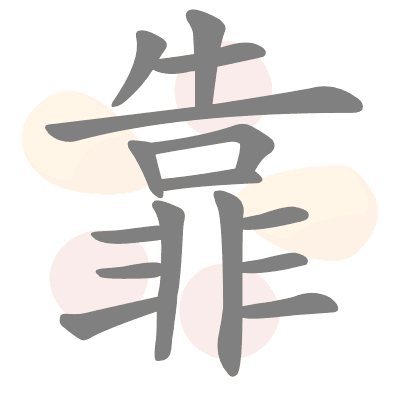靠
靠
v./prep. to lean against; to stand sth. against...; to get close to; to depend on; to trust; by
| 80% | 120% |
Register to get less ads.
Registration is free and once you are registered you use this word in your private vocabulary lists.
Then you can train your own vocabulary either here or using one of our applications for PC, iOS or Android.
Registration is free and once you are registered you use this word in your private vocabulary lists.
Then you can train your own vocabulary either here or using one of our applications for PC, iOS or Android.
Simplified Chinese Traditional Chinese |
Simplified stroke orders are based on the 'Standard of National Commonly-used Mandarin Chinese Characters (现代汉语通用字笔顺规范)', issued by the China National Language and Character Working Committee (国家语言文字工作委员会) on April 7th 1997. Traditional stroke orders are based on information issued by the Taiwan Ministry of Education.
他 他 phr. He became rich by selling newspapers. |
我 我 phr. I'd like to get a window seat. |
我 我 phr. The rest my life will depend on you. |
孩 孩 phr. The child fell asleep resting on his mother's shoulder. |
可 可 n. reliability |
他 他 phr. He lives off coal mining. |
靠 靠 adj. reliable, dependable, trustworthy |
可 可 nphr. dependable person, reliable person |
把 把 phr. to lean the ladders against a wall |
无 無 idiom. have no one to rely on, be left to one's own devices |
王 王 phr. Mr. Wang (a teacher or profes0sor) likes to lean on the desk while teaching. |




